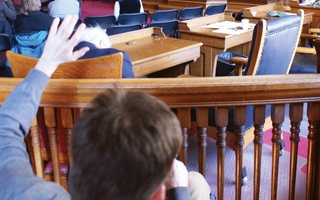Residents of Cambridge will head to the polls Tuesday for the city’s biennial municipal elections, which will place nine delegates on Cambridge’s City Council and six delegates on the School Committee. Residents of Boston will also be voting in their own elections for mayor and city council.
This year’s election will feature a greater array of candidates than in previous seasons—25 candidates will vie for spots on the City Council compared to 18 in 2011 and 15 in 2009. Of these candidates, seven are incumbents, four are repeat candidates, and 14 are running for the first time. Nine candidates are also running for positions on the Cambridge School Committee. Henrietta Davis, Cambridge’s current mayor, and Marjorie C. Decker, a city councillor, are not seeking reelection.
Harvard sophomore Logan E. Leslie ’16 also lists amongst the candidates for City Council. Over the last couple of months, his campaign has been working to rally students on campus and register them to vote. Harvard students’ voter turnout in a municipal election hasn’t spiked since MIT alumnus, Matthew DeBergalis, ran for Cambridge City Council in 2003.
This election season has focused around a series of issues including university relations, crime and safety, the environment, the issue of affordable housing, and Square business.
Many members of the Cambridge community, including Harvard students, have yet to decide which delegates will be receiving their votes.
One major concern in the community is the growing divide between the University and local residents of Cambridge.
“There is a trend with recent city councils...of moving away from thinking of Cambridge as a city that accommodates people of all socioeconomic backgrounds to one that focuses on middle and high income residents. I think it's really important that as much as possible, this new city council maintains Cambridge's fantastic inclusionary ethos,” Sam G. Greenberg ’14, a Harvard student and Cambridge resident, said.
Despite this divide, some candidates have staked out positions with Harvard voters in mind.
“Candidates have been making appeals to Harvard centric issues, such as campus security, in order to attract Harvard votes,” said Simon Thompson ’14.
Voting will take place in 30 locations across Cambridge and will be open from 7 a.m. to 8 p.m. The four polling stations in the University’s precinct include Graham and Parks Schools (44 Linnaean Street); Friends Center (5 Longfellow Park); Quincy House; and Gund Hall (48 Quincy Street). In Cambridge’s system of proportional representation, voters will be able to rank their preferences for as many candidates as they wish.
Read more in News
Group Petitions for Public Toilet in Harvard SquareRecommended Articles
-
Tsongas Predicts Kennedy Will RunWASHINGTON--Sen. Paul E. Tsongas (D-Mass.) said yesterday he won't stand in for Sen. Edward M. Kennedy '54 (D-Mass.) because he
-
Fact and Rumor.There was a cut in History 5 yesterday. A Shooting Club dinner is soon to take place. Mr. R. T.
-
Citizens Debate Climate PlansOver 60 Cambridge residents met for the second session of the Climate Emergency Congress on Saturday to vote on a list of recommendations responding to the city’s climate challenges. Four hours and 52 minutes later, the delegates came to the consensus to reconvene for a third session.
-
 Climate Congress Has Three New Proposals
Climate Congress Has Three New Proposals -
Middle Eastern CEOs Discuss ChallengesA panel of three Middle Eastern CEOs discussed the opportunities and challenges of doing business in the Middle East at the Kennedy School last night before dozens of entrepreneurs from the Arab world as part of a week-long AllWorld Summit.
-
Delegate CountingWith no defining narrative emerging out of Tuesday’s Republican debate, the time is long past to start looking long and hard at the delegate math of this year’s primary.













